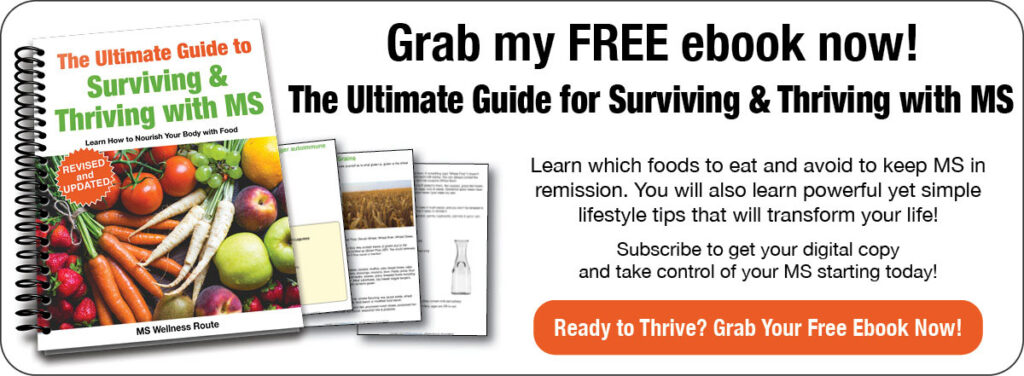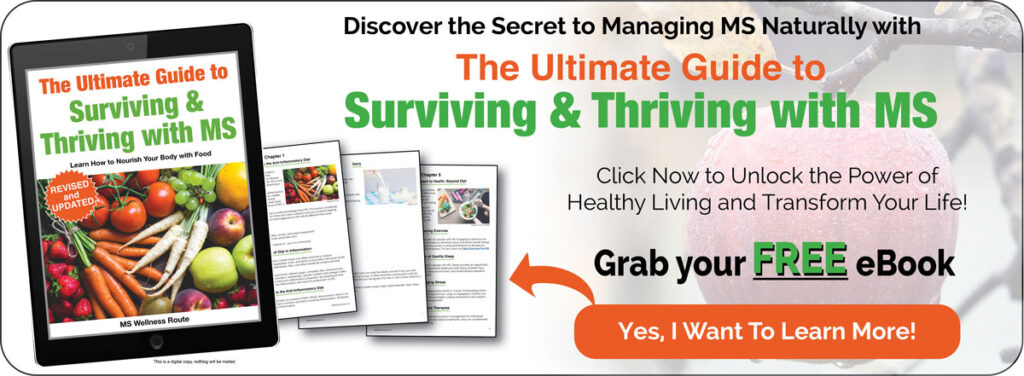Last Updated on January 30, 2025 by Cathy

Being diagnosed with Multiple Sclerosis (MS) is devastating news. It’s not fair that you got MS. You may even wonder – why? We all go through the “Why Me” phase, and it’s not fair, and living with multiple sclerosis can be challenging.
When I was first diagnosed (before there were any MS medications) my neurologist told me to “hope for the best and plan for the worst.” That was it! I felt like I was the only one in the world with MS. Today, it seems like everyone I know has someone in their family with MS. Not that long ago, it was predicted there were 400,000 people in the U.S. with MS. Today, according to the National MS Society, there are nearly one million people living with MS.
A new study funded by the National MS Society has confirmed that nearly one million people are living with MS in the United States, more than twice the original estimate from a previous study.
National Multiple Sclerosis Society
So what causes MS? No one really knows but there are many things that can trigger an autoimmune reaction. Researchers believe that a person is predisposed for MS but it’s environmental factors that trigger it.
Key Factors That Can Trigger Multiple Sclerosis
There is no “cure” for MS but there are things you can do to stop the progression and possibly reverse symptoms. That includes eating a healthy diet of clean and natural foods. No processed foods, refined sugar, or junk food – ever!
Possible Triggers to MS:
- Poor Diet
- Infections (bacteria, parasites, viruses, and yeast overgrowth)
- Environmental toxins (heavy metals, mold, pesticides, etc.)
- Chronic stress
- Hormones (adrenaline, cortisol, etc.)
Today there are many different choices on how to manage MS, from medications, stem cell transplants, and diet. Unfortunately, not one is a cure which means you need to change your lifestyle to keep MS in remission. Researchers say they are close to finding a cure. They have made great advances but we’ve been hearing this for decades so it’s best for you to get proactive and try to keep MS from progressing.
A Treatment Approach for Multiple Sclerosis
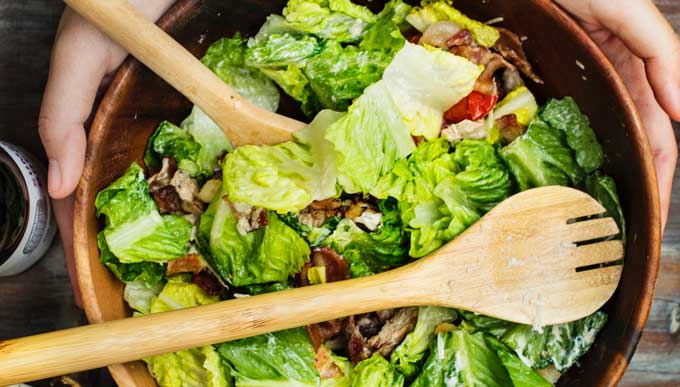
- Avoid Gluten/Grains, Dairy, and Legumes
- Avoid Processed Foods and Refined Oils
- Increase Your Vegetables
Eat a wide variety, a rainbow of colors - Eat Good Fats
avocados, coconut oil, fatty fish, flaxseeds, olive oil - Remove Refined Sugar
- Remove Toxins and Stress
- Get good quality sleep
- Exercise – Keep Moving!
- Sunlight
Start with your diet by eating clean, natural foods. Including foods without chemicals, antibiotics, growth hormones, pesticides, or GMOs. When you change your diet and you start feeling better don’t feel tempted to go back to your old ways or your symptoms will return.
People always ask me how I stick with this diet. It’s the determination to get all of my MS symptoms to reverse.
If you have an Autoimmune Disease it’s very important to have your vitamin D tested. Your score should be between 60-80. If your doctor gives you a “normal” test result, ask for the actual number.
The doctor of the future will give no medicine but will instruct his patient in the care of the human frame, in diet and in the cause and prevention of disease.
Thomas Edison
Regaining Control of Your Health
Avoid processed foods, refined sugar, refined carbohydrates, and trans-fats. No more fast-food restaurants, pizza delivery, or quick boxed meals. The standard American diet causes inflammation
Eat foods that are healing and nutrient-dense. Eating an anti-inflammatory diet like the paleo diet will help lower chronic inflammation. Include fermented foods since researchers discovered people with MS have lower levels of good bacteria in their gut.
Remove Gluten/Grains
When you first start you need to educate yourself and learn what gluten is. Gluten is what holds things together, it’s what gives the food an elastic texture. Gluten is found in MANY processed foods including bread, cereal, pasta, and seasonings.
Foods That Contain Gluten:
- Barley
- Bulgur
- Couscous
- Farina
- Graham Flour
- Kamut
- Matzo Flour, Meal, Bread
- Rye
- Semolina
- Spelt
- Triticale Wheat – including Wheat Flour, Whole Wheat Flour, Durum Wheat, Wheat Germ, Germ Oil, Wheat Bran, and Wheat Grass.
- Oats, oat fiber, and oat bran are gluten-free but they may contain traces of gluten due to the packaging process. Certified Gluten-Free (GF) oats are fine to eat. You could eliminate them for a while then reintroduce them to see if they cause a reaction.
Foods To Avoid:
All bread, all pastry items such as donuts, cakes, cookies, muffins, pies, bread/cake mixes, etc. Pancakes, waffles, cereals, crackers, dressings, croutons, bran. Pasta, pizza, flour tortillas, malt, commercial bullion and broths, marinades, sauces, gravy, breaded foods including vegetables, processed dry roasted nuts, and beer. Meat substitutes, soy-based veggie burgers, caramel color or flavors. Rice Dream (rice milk) contains gluten.
Remove Dairy
Foods That Contain Dairy:
- Milk, powdered milk, buttermilk, evaporated milk
- Chocolate milk, and other flavored milk
- Cheese, cottage cheese, cream cheese, cheese-whiz
- Ice cream, ice milk, sherbet
- Yogurt, frozen yogurt
- Heavy cream
- Half-and-half
- Coffee creamers
- Fruit dairy drinks
- Butter, margarine, margarine types
- Whip cream
- Milk chocolate
- Non-dairy creamer and non-dairy whipped topping (they contain milk derivatives)
Remove Legumes
A legume is a seed, pod, or another edible part of a leguminous plant used as food. They contain Phytates and Lectins, which are binding in your gut. Legumes prevent your body from properly digesting them. They also cause inflammation, indigestion, bloating, and gas. Legumes create a leaky gut and allow toxins to cross into the bloodstream.
Foods That Contain Legumes:
- Alfalfa
- Beans, all beans
- Lentils
- Licorice
- Peanuts
- Peas
- Red clover
- White clover
Avoid Processed Foods
Processed foods are full of all kinds of things that are bad for you. Such as high fructose corn syrup, maltodextrin, or partially hydrogenated soybean oil. It’s best to avoid the center aisles of the store, that’s where most of the processed foods are, instead shop on the outside aisles. Prepare your meals at home, double a recipe, and freeze half for a quick meal later. I like to keep a Lara Bar in my purse for when I’m out and I get hungry. Then I’m not tempted to eat something that can hurt my body from healing.
Foods to avoid include:
- Dairy
- Gluten
- Refined sugar
- Artificial flavors and sweeteners
- Natural flavors
- Corn (it’s mostly a GMO)
- Soy (it’s mostly a GMO)
- MSG
- Canola oil (it’s mostly a GMO)
- Pork (it’s high in fat and prone to parasites)
- Farmed fish (it’s washed in toxic chemicals due to parasites)
- Processed citric acid (it’s mostly derived from corn)
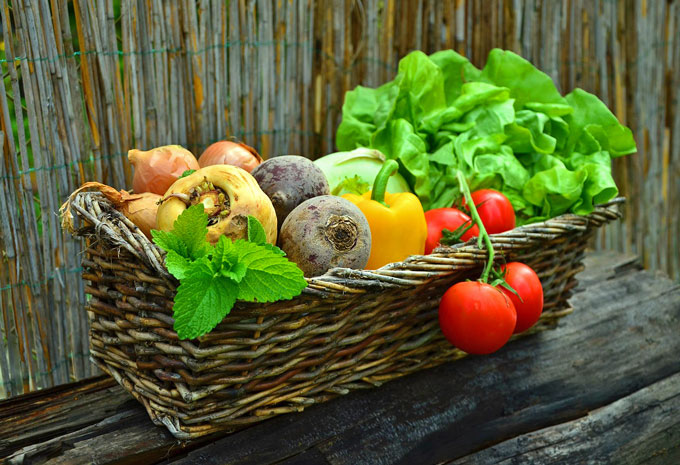
Eat A Huge Variety Of Fruits and Vegetables Daily!
They are high in antioxidants, fiber, minerals, phytonutrients, and vitamins – everything you need to heal. Vegetables are your main meal, with protein as a side dish. Eat organic as much as possible. If you can avoid the Environmental Working Group’s dirty dozen list. Grow a vegetable garden, eat locally as much as possible, eat a huge variety, and eat in season.
Vegetables to eat include:
- Dark Leafy Greens
Arugula, beet greens, bok choy greens, chard, collard greens, dandelion greens, kale, lettuce, mustard greens, parsley, spinach. - Sulfur (cruciferous)
Asparagus, cabbage, cauliflower, chives, bok choy, broccoli, Brussel sprouts, kale, turnips, radishes, onions, garlic, chives, leeks, shallots, mushrooms, rutabaga - Colored, eat a rainbow of colors every day
Refined Sugar
Since the 1970s researchers thought that high fat caused cardiovascular disease. They were wrong, it turns out that it’s sugar. Sugar is a toxin so no processed or artificial sweeteners. Instead, use raw honey, real maple syrup, organic sugar, or organic coconut sugar. Stevia is natural so it’s okay.
Quality Fats
For many decades we were taught that fats were bad for us and cause heart disease. But, not all fats are bad for us, our bodies and brains actually need healthy fats. Healthy fats boost brain function and lower cholesterol levels. Unhealthy fats like processed vegetable oils contribute to chronic inflammation and disease.
Look for healthy fats that are unprocessed:
- Avocados
- Bacon fat (nitrate-free)
- Coconut (milk, oil, etc.)
- Fatty fish (mackerel, salmon, sardines, trout, etc.)
- Grass-fed beef
- MCT oil
- Nuts and seeds (chia seeds, flaxseeds, walnuts, etc.)
- Olive oil
Flaxseeds
This is important! Flaxseeds have huge health benefits and should be consumed every day. They are a good source of fiber, Omega-3 fatty acids, and protein. Add them to your soup, salads, and smoothies wherever you can.
Herbs and Spices
Herbs and spices are beneficial because they not only enhance the flavor of food but also provide a natural source of antioxidants and various health-promoting compounds, contributing to overall well-being in a delicious way. Including them in your diet can support immune function, reduce inflammation, and add valuable nutrients without relying on artificial additives. Learn to use different herbs and spices while preparing meals.
What Can You Eat?
There is a lot of food you can still enjoy. Focus on foods that are nutrient-dense and contain antioxidants. Eat mostly vegetables including dark leafy greens, sulfur, and bright colors.
- Fruits and vegetables, preferably organic
- Good quality protein
- Grass-fed and finished meat or game meat
- Organ meats
- Pastured-raised poultry
- Wild-caught fish
- Canned salmon and sardines, BPA-free (Wild Planet)
*Omega 3 fats found in wild-caught salmon and sardines can help reduce inflammation.
If you’re looking for healthy snacks check out my page Healthy Foods And Snacks.
More Than Food…

Remove Toxins and Stress
This includes what you use in and around your house and what you put on your body. Such as shampoo, lotions, toothpaste, household cleaners, etc.
Sleep
Getting enough sleep is essential for your health, get 8 hours each night.
Exercise
Weight training helps to keep muscles strong. Also, try yoga, stretching, bicycling, walking, swimming, marching in place, or stair climbing. Just keep moving!
Sunshine
Getting sunshine is extremely important. Spend at least 15 minutes outdoors every day in the early morning or late afternoon. You not only soak up some Vitamin D, but it also helps lift your spirits.
Water
You should be drinking half your weight in ounces every day. If you weigh 150 lbs you should be drinking 75 ounces of water. This helps remove toxins from your body.
Quick Links To Information In This Post:
Supplements for Multiple Sclerosis
Everyone is different so it’s best to consult your doctor before starting a new supplement. Here are a few that are recommended for people with MS:
- Vitamin D – Get checked, your score should be between 60-80 ng/mL.
- Omega 3’s – helps reduce inflammation. It improves neurological function and promotes better nerve functioning.
- Probiotic – to help heal your gut, a good one to start with is ReNew Life.
Check with your doctor before starting any supplements.

The Ultimate Guide to Surviving & Thriving with MS:
The Ultimate Guide to Surviving & Thriving with MS

Tired of feeling sick and tired! Learn how to use food as your medicine. This guide will teach you which foods are healthy so YOU can start feeling better!
You'll also be subscribed to my weekly newsletter with extra tips to get MS into remission.
Enter my free resource library for my latest files and printables! Password is 'healthy' -- please copy and paste that in at the link above. Thanks for being a subscriber!!
Want to remember this health tip? Save it to your favorite Pinterest board!
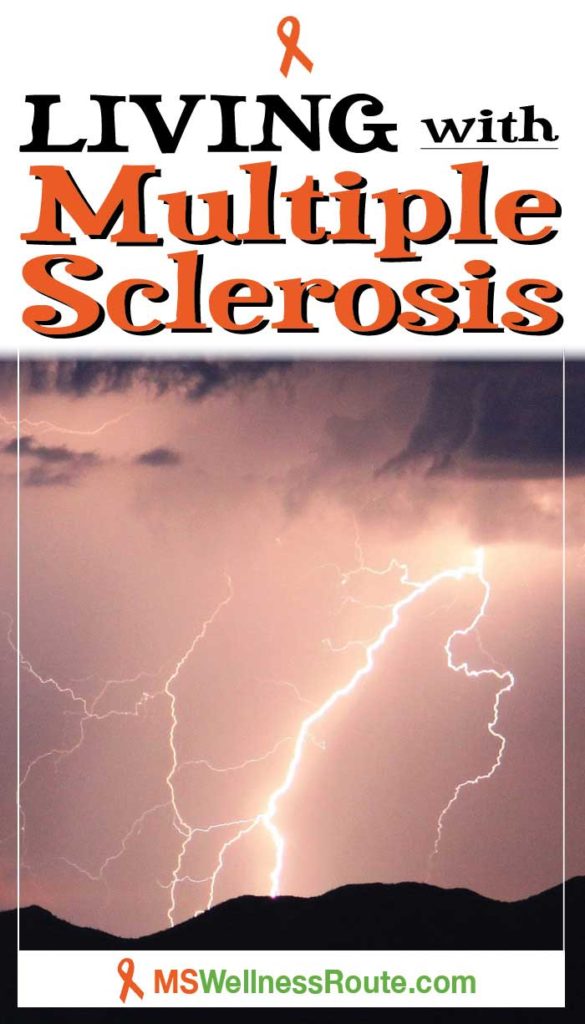
 MS Awareness Month Sale! All Ebooks 50% Off!
MS Awareness Month Sale! All Ebooks 50% Off! 